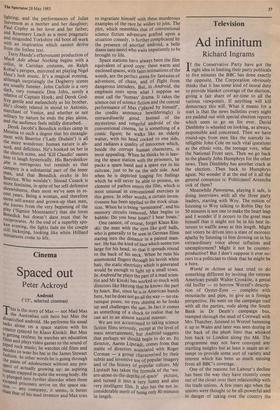Cinema
Spaced out
Peter Ackroyd
Android ('15', selected cinemas)
Thishis is the story of Max — not Mad Max Australian cult hero but Max the dissatisfied android. He performs his usual tasks alone on a space station with his creator (played by Klaus Kinski). But Max setting restless; he watches sex education films and plays video games to the sound of Piped rock music; he watches old films and decides to wear his hat in the James Stewart fashion. In other words he is going through the pains of adolescence without any pro- .
11Pect of actually growing up: an aspiring
,urtian trapped in quite the wrong body. He l' Plunged into further disorder when three escaped prisoners arrive on the space sta- tion — any company, it seems, is better than that of his mad inventor and Max tries
to ingratiate himself with these murderous examples of the race he wishes to join. The plot, which resembles that of conventional science fiction adventure grafted upon a situation comedy, is further complicated by the presence of another android, a belle dame sans merci who waits impatiently to be brought to life.
Space stations have always been the film equivalent of good copy: these warm and enclosed spaces, with faint intimations of the
womb, are the perfect arena for fantasies of adventure, of chase, and of flight from dangerous intruders. But, in Android, the emphasis rests upon what I suppose we must call the 'human' drama. It takes the science out of science fiction and the central performance of Max ('played by himself , the credits announce bewilderingly) is extraordinarily good. Instead of the mysterious and vengeful android of the conventional cinema, he is something of a comic figure; he walks like an elderly waiter, with his head cocked to one side, and radiates a quality of innocence which, beside the corrupt human characters, is most appealing. When he thinks he is leav-. ing the space station with the prisoners, he packs a spare hand and a spare eye in his suitcase, just to be on the safe side. And when he is depicted longing for feelings which he will never be able to possess, an element of pathos enters the film, which is most unusual in conventional exercises in this genre. In other words, a certain inven- tiveness has been applied to the stock situa- tion. When he is being 'terminated', and his memory circuits removed, Max begins to babble: Do you hear boats? I hear boats.'
One cannot, of course, forget Klaus Kin-
ski: the man with the eyes like golf balls, who is generally to be seen in German films staring into the distance in a pained man- ner. He has the kind of face which seems too large for his head, so that it spreads round to the back of his neck. When he runs his anemonoid fingers through his lavish white hair, the static electricity which is generated would be enough to light up a small town. In Android he plays the part of a mad scien- tist and Mr Kinski has worked so much with directors like Herzog that he knows the part by heart. But, since he is in American hands here, but he does not go all the way — no sta- tuesque poses, no eyes shining as he looks up and challenges the sun. In fact it comes as something of a shock to realise that he can act in an almost natural manner.
We are not accustomed to taking science fiction films seriously, except at the level of
mass entertainment, but Android suggests that perhaps we should begin to do so. Its director, Aaron Lipstadt, comes from that stable of directors associated with Roger Corman — a group characterised by their subtle and inventive
and of the history use of popular imagery ry of popular culture. Mr Lipstadt has taken the formula of the 'we- are- alone-in- the-depths- of- space' picture, and turned it into a very funny and also very intelligent film. It also has the not in- considerable merit of being only 80 minutes in length.














































 Previous page
Previous page